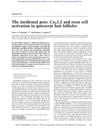 3 citations,
December 2022 in “npj Regenerative Medicine”
3 citations,
December 2022 in “npj Regenerative Medicine” HSPGs help control stem cell behavior, affecting hair growth and offering a target for hair loss treatments.
 3 citations,
September 2019 in “Clinical and experimental dermatology”
3 citations,
September 2019 in “Clinical and experimental dermatology” Basal cell carcinomas may differentiate similarly to hair follicles and could be influenced by hair cycle-related treatments.
 3 citations,
January 2017 in “Journal of cosmetology & trichology”
3 citations,
January 2017 in “Journal of cosmetology & trichology” The food supplement with L-cystine, Serenoa repens extract, and biotin safely reduced hair loss and improved hair growth in men and women.
[object Object]  3 citations,
October 1993 in “The Journal of Dermatology”
3 citations,
October 1993 in “The Journal of Dermatology” The review suggests limited treatments for common hair loss conditions, with potential for future improvements.
 3 citations,
October 1982 in “Postgraduate Medicine”
3 citations,
October 1982 in “Postgraduate Medicine” Most types of hair loss can regrow naturally, but there are no effective cures for male pattern or age-related hair loss, and only limited options for females.
 2 citations,
January 2014 in “Hair therapy & transplantation”
2 citations,
January 2014 in “Hair therapy & transplantation” New treatments for hair growth disorders are needed due to limited current options and complex hair follicle biology.
 1 citations,
January 2021 in “Skin appendage disorders”
1 citations,
January 2021 in “Skin appendage disorders” Chemotherapy patients don't all lose their hair due to factors like hair growth rates, age, genetics, and the type of drugs used.
 1 citations,
January 2017 in “Springer eBooks”
1 citations,
January 2017 in “Springer eBooks” The document explains how hair follicles develop, their structure, and how they grow.
 July 2023 in “Journal of Clinical Medicine”
July 2023 in “Journal of Clinical Medicine” The document concludes that understanding hair follicle histology and the hair cycle is crucial for diagnosing alopecia.
 January 2015 in “Springer eBooks”
January 2015 in “Springer eBooks” Hair health is influenced by genetics, aging, and environmental factors, with proper care needed to maintain it.
January 2010 in “China Animal Husbandry & Veterinary Medicine” RORs may influence cashmere growth cycles.
 June 1989 in “Diseases of the Colon & Rectum”
June 1989 in “Diseases of the Colon & Rectum” Some patients experience temporary hair loss after ulcerative colitis surgery, likely due to illness rather than the surgery itself, and it usually grows back within six months.

Rapid weight loss can cause temporary hair loss, but hair usually grows back.
 13 citations,
January 2014 in “PubMed”
13 citations,
January 2014 in “PubMed” Adiantum capillus-veneris Linn reduced hair loss and improved hair growth in mice with testosterone-induced alopecia.
 11 citations,
January 2014 in “The Scientific World Journal”
11 citations,
January 2014 in “The Scientific World Journal” Cynatine HNS improves hair and nail quality in 90 days.
[object Object] 1 citations,
February 2022 in “Research journal of pharmacy and technology” Wrightia tinctoria extract may promote hair growth better than minoxidil.
July 2024 in “Vestnik dermatologii i venerologii” Post-COVID-19 hair loss is different from androgenetic alopecia and can be identified by lower copper and higher selenium levels.
102 citations,
July 2020 in “International journal of molecular sciences” Hormones like testosterone and estrogen significantly affect hair growth and structure.
42 citations,
June 1998 in “The journal of investigative dermatology/Journal of investigative dermatology” PAI-2 helps in the maturation and protection of hair and nail cells.
1 citations,
November 2023 in “Journal of Ayurveda and Integrative Medicine” Ashwagandha serum improves hair health and quality of life in people with hair loss.

TLR2 helps control hair growth and regeneration, and its reduction with age or obesity can impair hair growth.
64 citations,
March 2004 in “The journal of investigative dermatology/Journal of investigative dermatology” GPRC5D is linked to the formation of hair, nails, and certain tongue areas.
 57 citations,
March 2011 in “The American Journal of Dermatopathology”
57 citations,
March 2011 in “The American Journal of Dermatopathology” Chemotherapy can cause permanent, non-reversible hair loss similar to pattern baldness.
 31 citations,
March 2017 in “Journal of The American Academy of Dermatology”
31 citations,
March 2017 in “Journal of The American Academy of Dermatology” Some breast cancer patients developed permanent hair loss after chemotherapy and hormonal therapy, showing patterns similar to common baldness and alopecia areata.
 30 citations,
December 2018 in “International Journal of Biological Macromolecules”
30 citations,
December 2018 in “International Journal of Biological Macromolecules” Chitosan and surface-deacetylated chitin nanofibers may help treat hair loss.
20 citations,
August 2007 in “Molecular therapy” Applying a DNA vaccine to skin with active hair growth boosts immune response and protection against anthrax in mice.
 9 citations,
February 2022 in “BMC Genomics”
9 citations,
February 2022 in “BMC Genomics” Melatonin affects gene expression in goat hair follicles, potentially increasing cashmere production.
 3 citations,
June 2013 in “Genes & development”
3 citations,
June 2013 in “Genes & development” CaV1.2 helps activate hair follicle stem cells without calcium flux.
 1 citations,
April 2016 in “Journal of Investigative Dermatology”
1 citations,
April 2016 in “Journal of Investigative Dermatology” Blocking Prostaglandin D₂ may help treat hair loss.
 July 2024 in “Journal of Cosmetic Dermatology”
July 2024 in “Journal of Cosmetic Dermatology” Hydrophilic melanin may help hair grow by improving blood flow and regeneration.






















